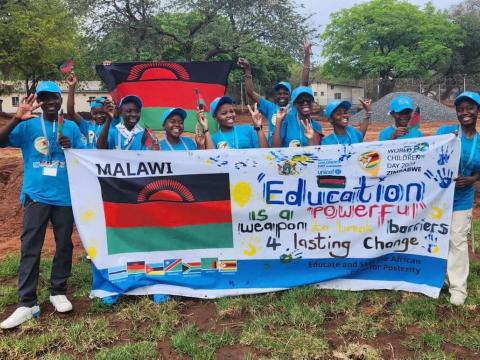Children of Southern Africa Meet Leaders in Victoria Falls to Demand Change on World Children’s Day

By Trinity Kubalasa
Communications and External Engagement Manager, World Vision Malawi.
This weekend, over 7,000 children from seven Southern African countries gathered in Victoria Falls, Zimbabwe, for the 2024 Regional World Children’s Day celebration under the theme “Educate and Skill the African Child for Posterity”. The children met with Presidents and other high-ranking officials from Botswana, Zimbabwe, Malawi, Mozambique, Namibia, South Africa, and Zambia to call for improved education and stronger protections for children when schools are disrupted by conflict or extreme weather events.

Leading up to the event, children from Malawi and across the region came together to issue a Regional Call-to-Action, outlining their shared vision for a brighter and more inclusive future. The Children highlighted education as a critical tool for empowerment, equality, and prosperity, calling on their leaders to ensure every child has access to quality, inclusive, and relevant education. Key demands included financial support for most vulnerable children, the integration of life and digital skills into school curricula, and the creation of safe, well-equipped learning environments.
“We want our voices to be heard because we want to change the world,” said 16-year-old Busisiwe Phakati from South Africa. A 17 years old Coreen Chola from Zambia added that “The curriculum should equip us with the relevant skills to navigate life from a very young age, especially in today’s rapidly changing world.”
Faith, 16 from Malawi called for governments to prioritize education and protect children’s rights. “ The time for leaders to act, is now”, she emphasized.

The 2024 World Children’s Day celebrations put a strong focus on child participation in shaping policies that affect their lives. The children shared their perspectives on various of issues, from education to climate change, violence, and mental health, directly engaging with decision-makers in the region.
Zimbabwe’s President, Dr. E.D. Mnangagwa, addressed the children and leaders, emphasizing the collective responsibility to uphold the rights and welfare of children. He continued that World Children’s Day is a powerful reminder that the voices of children on critical issues like education, inclusivity, and climate change must always be heard.
“You, our children must also grow up knowing that you have a duty to build, develop and industrialize your countries, our SADC region, the continent and finally the world at large. Never look down upon yourselves, Mnangagwa, said.

Despite progress, children in Southern Africa and Malawi in particular, continue to face significant challenges in accessing their rights, especially in education. Challenges such as climate change, economic pressures, and rising debt continue to create obstacles, leading to extensive gaps in education and well-being. A recent UNICEF survey of over 5,000 children across the region found that while 87% are aware of their rights, many face barriers like high school fees, a lack of learning materials, and inadequate sanitation and hygiene facilities.
Etleva Kadilli, UNICEF Regional Director for Eastern and Southern Africa, addressed the gathering, stating, “Children can make a huge difference. They can partake in development. Children across gathered countries, you are the reason why we are here. As parents, it’s not all about us- it’s about what our children become, Kadili emphasized.
Advocate Duma Gideon Boko, President of Botswana, addressed the gathering with an impassioned promised to prioritize children’s demands.
“ The children spoke eloquently, with well- articulated presentations. They have made their calls, and I have heard them- they spoke to me and to my heart, said Boko.

Boko pledges to work alongside children to address their concerns. “Your demands will be mine to carry, together with you. I pledge to you that we will intensify efforts to meet the demands placed before us today and we will do so together because that’s the only way we can go far, said Boko.
Since the first regional World Children’s Day in 2021, significant strides have been made in advancing children’s rights across the participating countries.
In Zimbabwe, for example, the Education Act was recently passed, prohibiting corporal punishment, ensuring pregnant girls can stay in school, and providing sanitary products for girls. Botswana has established a new Ministry of Child Welfare and Basic Education, reaffirming its commitment to child protection and rights. In Namibia, efforts to make schools more inclusive are underway, while Zambia has recruited 4,200 new teachers and is working to reduce the pupil-teacher ratio.
Further developments include Malawi’s plan to launch pre-primary classes for children nationwide starting in 2025. South Africa on the other hand has a multi-year recovery plan for education following COVID-19, and Mozambique’s significant progress in increasing school attendance, especially for children with special needs.
While much progress has been made, children also recognize their own role in promoting positive change. Esther, 16 from Malawi stresses the need for children to also be responsible by being accommodative, embrace diversity and create more conducive learning environments for every child.
It is possible for have a more conducive and inclusive environment for every child regardless of where they are coming from and that should start with us”, she said .
At the close of the celebration, President Mnangagwa handed the World Children’s Day torch to newly elected President Boko of Botswana, who will host the event in 2025. The symbolic handover marked the continued commitment of Southern African nations to advancing children’s rights and ensuring that the voices of young people are heard in the fight for a better, more equitable future.